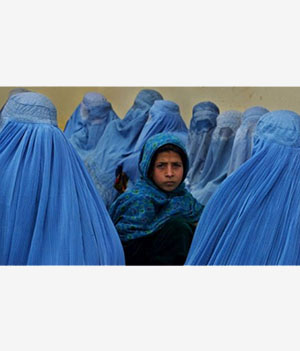Afghanistan’s Complex Women’s Rights Discourse

By Dr. Davood Moradian
Are women’s rights and gender equality universal or culturally and geographically confined to the West? Are there certain cultures and political systems that are inherently misogynistic? Are the concerns of Western powers’ about women’s rights sincere or are they an instrument to pursue their own political objectives against their rivals? Does women’s empowerment help or hinder conflict resolution in entrenched conflict zones such as Afghanistan? Have significant and unprecedented gains in women’s rights in Afghanistan since 2001 taken root among indigenous communities? Are these gains sustainable and protected in light of receding Western engagement with Afghanistan? Can Afghan men become essential stakeholders in the consolidation and promotion of women’s rights?
The above questions illustrate the complexity and the multifaceted nature of the women’s rights discourse taking place in Afghanistan today. And the answers to these questions reflect competing political and philosophical perspectives. Women’s rights and emancipation must be understood in the ongoing universal struggle for creating a just and humane society. What is truly universal is “patriarchalism,” a system that treats women as second-class objects and subservient to male domination. All cultures, religions, nations, and most political and economic systems have contributed to creating and sustaining a universal patriarchal system, though with different degrees. The women’s emancipation has also been a universal endeavor across all nations, cultures and eras, with different rates of success. Therefore, neither women’s rights nor patriarchalism should be seen as an exclusive feature of any given society or culture. They are humanity’s shared heritage and responsibility. A trans-cultural understanding of women’s rights is confirmed by the finding of The Asia Foundation’s 2013 public opinion survey, in which nearly all Afghans (90%) agree with the idea that everyone should have equal rights under the law, regardless of their gender. In public imagination, Afghan men are seen as among the most misogynistic, if not on the top of such a list.
Patriarchalism and its ensuing misogynistic manifestations are forms of injustice. Human beings are socially justice consciousness and despise injustice. Even the most unjust and horrific acts and actors resort to justice to justify and legitimize their choices and behaviours. The love of justice and beauty, alongside other universal virtues has transcended all humanity’s differences. What we have yet to achieve is a universal understanding and definition of justice. Therefore, the discourse of women’s emancipation and women’s rights should be liberated from the realm of particularism, including a solely gender-based approach. The equality of men and women is the requirement of justice and an essential pillar of a humane and just society. Patriarchalism and women’s subjugation are clear manifestations of injustice and features of less-humane and unjust societies. Therefore, the “justice-lovers and believers” cannot and should not tolerate any form or justification for unjust institutions, laws, and acts that deny the inherent equality of human beings regardless of their gender, class, race, status, sexuality or religion.
Unfortunately, Afghan women have borne the injustices of entrenched patriarchal social, political, religious, and economic systems, far more so than Afghan men. Nearly four decades of persistent conflict have brought immense physical, social, and psychological pain to the Afghan nation, men and women. However, the Afghan women have disproportionally suffered as a result of absence and/or breakdown of redressing and supportive measures and spaces. On the other hand, Afghan women have seen unprecedented and unimaginable opportunities and gains in their struggle for dignity and equality since the collapse of the apartheid regime of the Taliban in late 2001. Chief among them are the legal protection and recognition in the Afghan constitution, opening public spaces and offices for women’s participation and overall improvement in Afghanistan’s economy, governance, and politics and international solidarity.
However, these gains remain vulnerable and fragile. Their protection and consolidation require continuing and strengthening partnership among Afghans, both men and women, and the international community. To this end, we have to strive toward identifying legitimate, effective, indigenous, and sustainable ways to facilitate Afghan women’s journey forward and contribution to creating a peaceful, stable, and prosperous Afghanistan.
The article was first published in The Asia Foundation on December 4, 2013.
Dr. Davood Moradian is director-general of the Afghan Institute for Strategic Studies and former senior policy adviser in the Ministry of Foreign Affairs.
Academicians and Officials interested to publish their academic pieces on this page, please approach us through: opinions@aiss.af
The article does not reflect the official opinion of the AISS.
